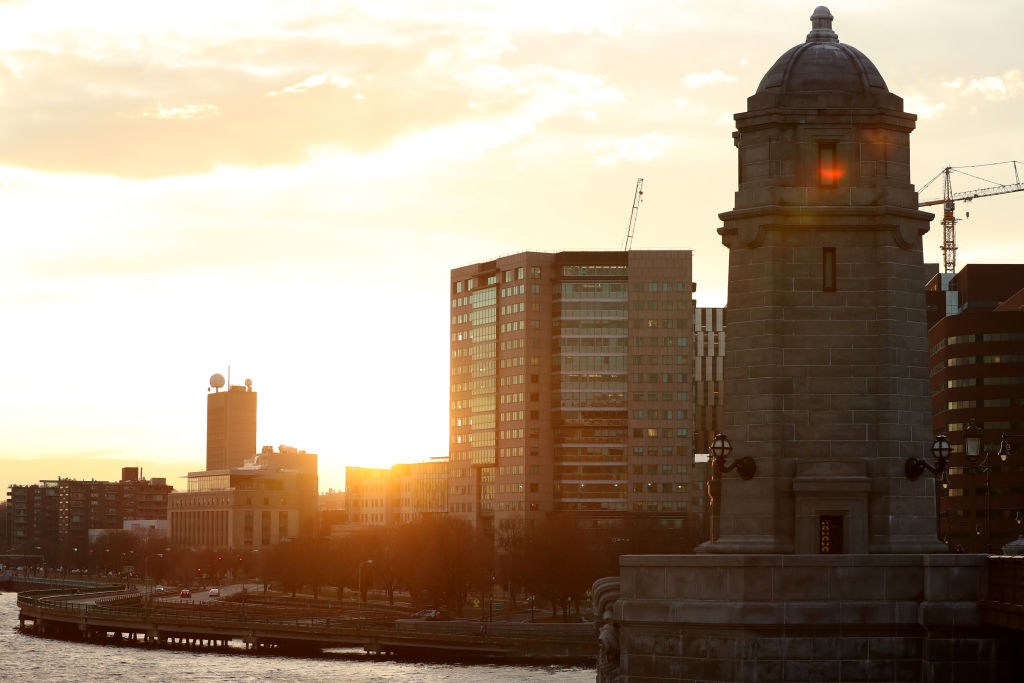The children will never forgive us. Every day through the summer, we sit our three girls down to tea, ply them with cake and sandwiches, and read aloud a chapter from R.J. Unstead’s The Story of Britain. Unstead was an English schoolmaster and he wrote this children’s primer in 1971. Written in crystalline English, it is packed with contraband information about racist and imperialist topics such as Roman plumbing, Magna Carta, Shakespeare, the steam engine, parliamentary democracy and Winston Churchill.
The girls are patient, though the sheer weight of information does cause one of them to listen with her head on the table. Every few days, we augment the indoctrination with the relevant episode of Kenneth Clark’s Civilisation, pausing the film to deliver short explanations. The girls realize that all their summer vacations have been planned around the series, but they find it hard to watch Clark’s tour of Europe’s treasure houses: ‘His teeth are disgusting.’
In the fall, a Harvard history professor comes over for tea in the backyard. We don’t read him a chapter from The Story of Britain. We don’t need to. When he makes the mistake of referring to Oliver Cromwell, the girls regurgitate Unstead’s chapters on the Stuarts and the divine right of kings.
‘Anti-Catholic propaganda,’ he says.
A new documentary has come out about Ronnie Scott, the English jazz musician, and the jazz club he founded in London. My father Benny played with Ronnie and helped set up the club; my brother Leo worked there, I’ve been going there since I was eight, and I played there when I was a working musician.
The director emails me a link and a password, and I fall through time and into the music. My father, who died 22 years ago, is still talking away, filmed in the Eighties to mark the club’s 30th anniversary. The music is still alive too: Ella, Oscar, Sonny Rollins, Buddy Rich. I realize, as I frequently do, that I remain a musician even though I came off the road 17 years ago.
I discuss this with Leo in our daily phone call. He has spent lockdown recording radio programs in his garden shed near London, though he’s allowed into the house for meals and bathroom breaks. ‘Other middle-aged men lie in bed and replay golf shots in their heads,’ he says. ‘We replay old gigs.’
When I started writing, Maja and I left London for Stockholm, where she had grown up and I could stay out of trouble. Each morning, I put on a three-piece suit and tie for my commute from the kitchen to my desk in the living room. Musicians call this ‘woodshedding’, retreating to work on your chops. So I was relatively chipper when the lockdown began: it’s where I live.
Our daily Spectator conference is conducted online. I could dress from the waist up, but I remember Ruskin’s outrage upon climbing a ladder in a Venetian church and finding that only the visible part of the doge Andrea Vendramin’s statue had been finished, so I wear socks too. One morning, a woman in shirt and socks wanders across the screen behind a colleague. No one says anything. It’s like the ‘invisible gorilla’ experiment.
I was not ready for lockdown. We are slowly going mad.
I take the redeye to London on an empty plane. My mother and stepfather are alive but increasingly eccentric. The streets are half-empty and many of the shops in the West End are boarded up. The receptionist at The Spectator’s office is sitting in a plastic box, like that art installation inside which Tilda Swinton slept. I eat a kosher pastrami sandwich of Proustian succulence at Reuben’s, am stricken with dyspepsia while visiting the National Gallery to review its Artemisia Gentileschi exhibition for the Wall Street Journal, then meet Leo at Sergio’s on the night before the second lockdown starts.
‘I’ve got a lovely special today,’ Costa the proprietor says, with the enthusiasm of a man with a fridge to empty. ‘It’s lobster…lobster…actually I can’t remember what the fuck it’s called.’ ‘Thermidor?’
I order the veal al limone, as I’ve done every time for 30 years, and think of the Thermidorian reaction: the Terror, the fall of Robespierre, the rise of Napoleon and the administrative state. Everything is as it was in London, but everything has changed, and when the vaccine comes the reaction will come. We are lurching forward into some new and almost certainly less pleasant era. I think of Burt Lancaster in The Leopard. I feel like Burt Lancaster in The Swimmer. Like him, I do my own stunts. No wonder my knees hurt when it’s about to rain.
Back in Cambridge, the natives are more pleased with themselves than usual. Biden has won the election, no one knows anyone who voted for Trump, the Dow has crested 30,000 and a local company, Moderna, has contrived a vaccine. I distribute a three-month supply of English tea bags and candy to a grateful household.
At dusk I take my daily walk around Fresh Pond. It is the end of the year, the water is black and misty, the path empty. I don’t wear a mask outside when there’s no one around, but I carry one and whip it out as needed. Halfway round the Pond, an old lady appears out of the darkness, jogging slowly anti-clockwise in reckless defiance of City regulations. I reach into my pocket, but my mask snags on my keys.
‘Asshole,’ she says from behind her mask.
I’ve been cambridged.
This article was originally published in The Spectator’s January 2021 US edition.

























